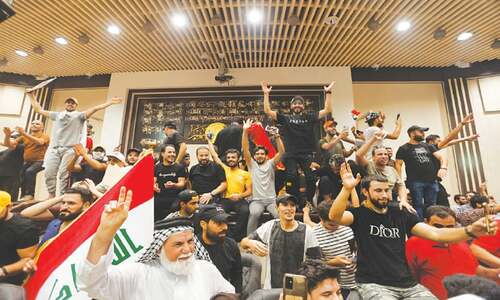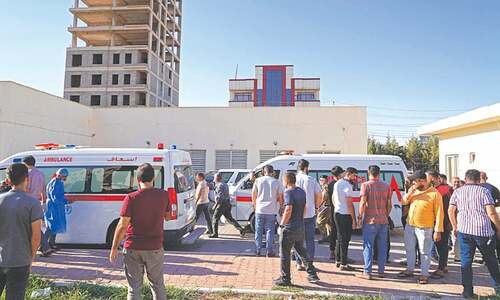Iraqi security forces were on high alert in Baghdad on Monday as tensions soared after rivals of Shiite Muslim cleric Moqtada Sadr, whose supporters are occupying the parliament, called for counter-demonstrations.
A political standoff 10 months after Iraqis went to the polls pits Sadr — a populist with a devoted following of millions among the country’s majority Shiite population — against the powerful pro-Iran Coordination Framework, another Shiite alliance.
Sadr’s supporters have been occupying parliament in the normally high-security Green Zone — also home to government buildings and embassies — since Saturday.
They started their protest in response to the rival alliance’s prime ministerial nomination.
Large numbers of security forces set up roadblocks and checkpoints, ahead of calls by supporters of the Coordination Framework slated to start around 5pm local time (1400 GMT).
The protests are “not directed against any particular group”, the supporters said on social media.
The protest is expected to take place on a road leading to the Green Zone, not far from where thousands of Sadr supporters were still bedded down at the parliament, waving flags and pictures of Sadr.
A Sadr loyalist has also called on supporters of the cleric to protest across Iraq’s provinces, in demonstrations to take place at the same time.
The Coordination Framework includes lawmakers from the party of Sadr’s longtime foe, ex-prime minister Nuri al-Maliki.
It also represents the powerful pro-Iran former paramilitary alliance Hashed al-Shaabi, now integrated into the regular forces.
Hadi al-Ameri, who heads a faction of the Hashed al-Shaabi, repeated a call on Monday for “constructive dialogue enabling solutions to be found to points of contention”.
He warned against “an atmosphere of media escalation, sparked by statements and counter-statements calling for mass mobilisations that could get out of control and lead to violence”.
In multi-confessional and multi-ethnic Iraq, government formation has involved complex negotiations since a 2003 US-led invasion toppled dictator Saddam Hussein, but in this case, 10 months of political deadlock have left the country without a government, a new prime minister or a new president.
Sadr’s massive mobilisation of supporters in recent weeks has underscored the political clout of the firebrand preacher, who once led a militia against American and Iraqi government forces.













































